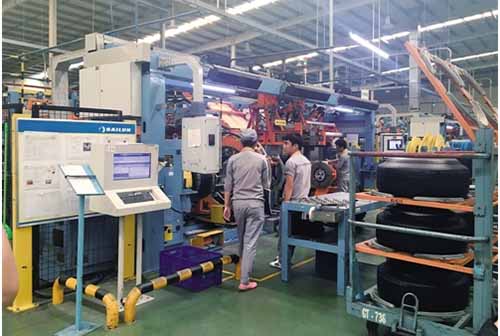Overseas Branches Become Advantages of Sailun Jinyu Group
Not long ago, Sailun Jinyu Group held an online reception of investors.
Li Qingji, securities representative of Sailun Jinyu, and the CFO Liu Yanhua answered questions of the investors.
All-steel Tire Project in Vietnam Plant to Come on Stream before Year-end
Li said establishing production plants in overseas market to transfer the capacity and exploit new markets will reduce the impacts of trade protection measures on an enterprise’s export business. But investing overseas has advantages as well as risks.
Liu introduced that Sailun Jinyu’s all-steel tire project with an expected annual capacity of 1.2 million tires in Vietnam will come on stream within this year and the products will be put into the market in the next year.

(Sailun Jinyu's factory in Vietnam)
The semi-steel tires produced by the Vietnam branch are mainly for exporting to the U.S. and the current output capacity is around 7.5 million tires per year.
The first-phase project reached an annual capacity of 7.8 million passenger car tires and engineering tire capacity of 15,000 tons; the second-phase project which is under construction is expected to reach an annual capacity of 1.2 million commercial vehicle tires and engineering tires of 35,000 tons.
In the first half of this year, Sailun Jinyu’s Vietnam branch accomplished operating revenue of 444 million yuan and the net profit was about 60 million yuan.
Overseas Branches Become Main Sources of Trade Business
In 2014, Sailun Jinyu purchased two sales companies overseas. Li said that the two companies are the U.K.-based KRT Group and Canada-based GOME International.
Both the companies adopt market-oriented operation and they can choose the brands they want to operate freely. Besides brands of Sailun Jinyu Group, they also operate other leading international brands and some of Chinese brands.
The two companies became main resources of Sailun Jinyu’s trade business for tire. In the first half of this year, the group’s operating revenue from tire trade totaled 751 million yuan.
Li said international operation becomes a primary advantage of Sailun Jin yu in response to fierce market competition.
The group’s production base in Vietnam operates smoothly and becomes a major way addressing the anti-dumping and anti-subsidy measures by the U.S. against tires from China.
The group also emphasizes establishing sales channels in other countries to enhance its overall competitiveness.
The group’s controlling subsidiary in Thailand has provided vital support for its control of information about the raw materials market by running natural rubber business.
Pressure in Managing Overseas Companies
Li said operating business overseas has risks as well.
Sailun Jinyu’s scale increases continuously and set up overseas plants, sales companies and R&D centers. But because of differences in operating environments and culture, there are pressures while managing overseas companies.
Accordingly, the group fully respects local culture and customs, adopts localized modern management modes and makes efforts not to affect the management because of concept and cultural differences.
An investors asked that Sailun Jinyu had planned to set up a tire plant in Turkey, how are things going on?
Liu answered that the proposal had been discussed. But there is no detailed investment plan because of political situation. And the market is not a focus of Sailun Jinyu.
- Tireworld Insight: Domestic tire makers eye overseas expansion
- Tireworld Insight: Price disparity severe between China's rubber exports and imports
- Tireworld Insight: China tire exports dependent on US market performance
- Tireworld Insight: SHFE rubber expected to move in tight range in short-term
- Tireworld Insight: Rubber futures to test near-term resistance at 15,000 yuan/tonne
- Tireworld Insight: China’s tire industry on track of rapid growth






